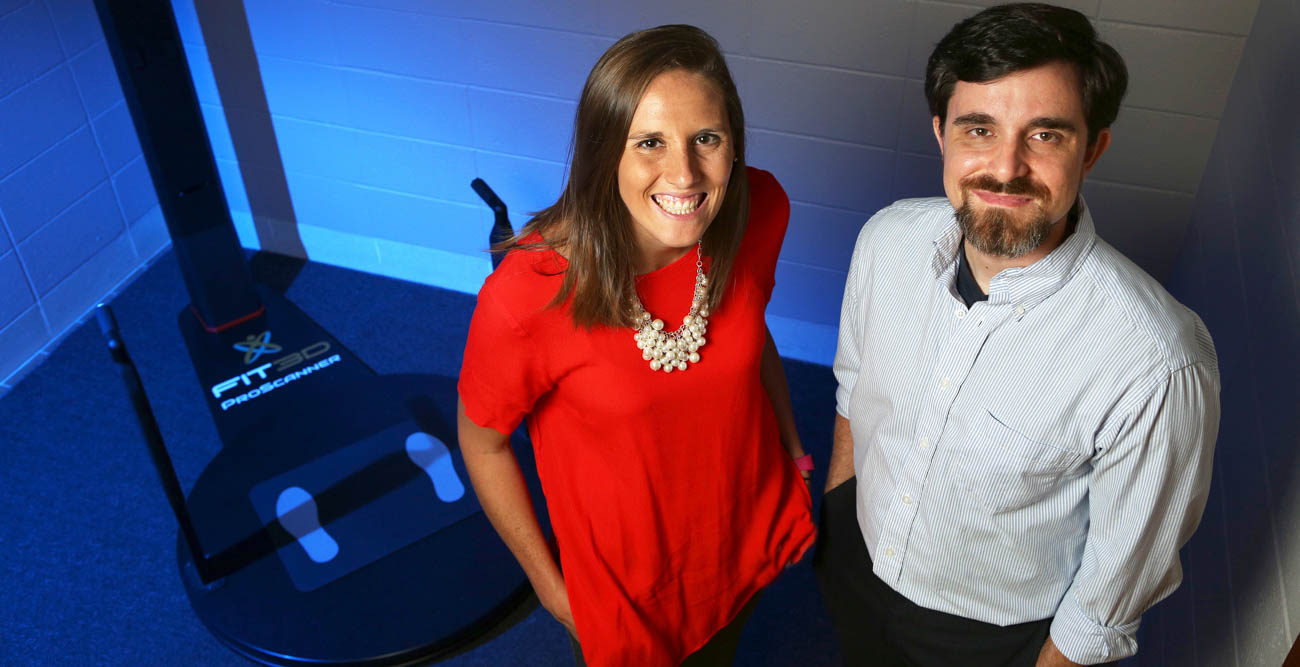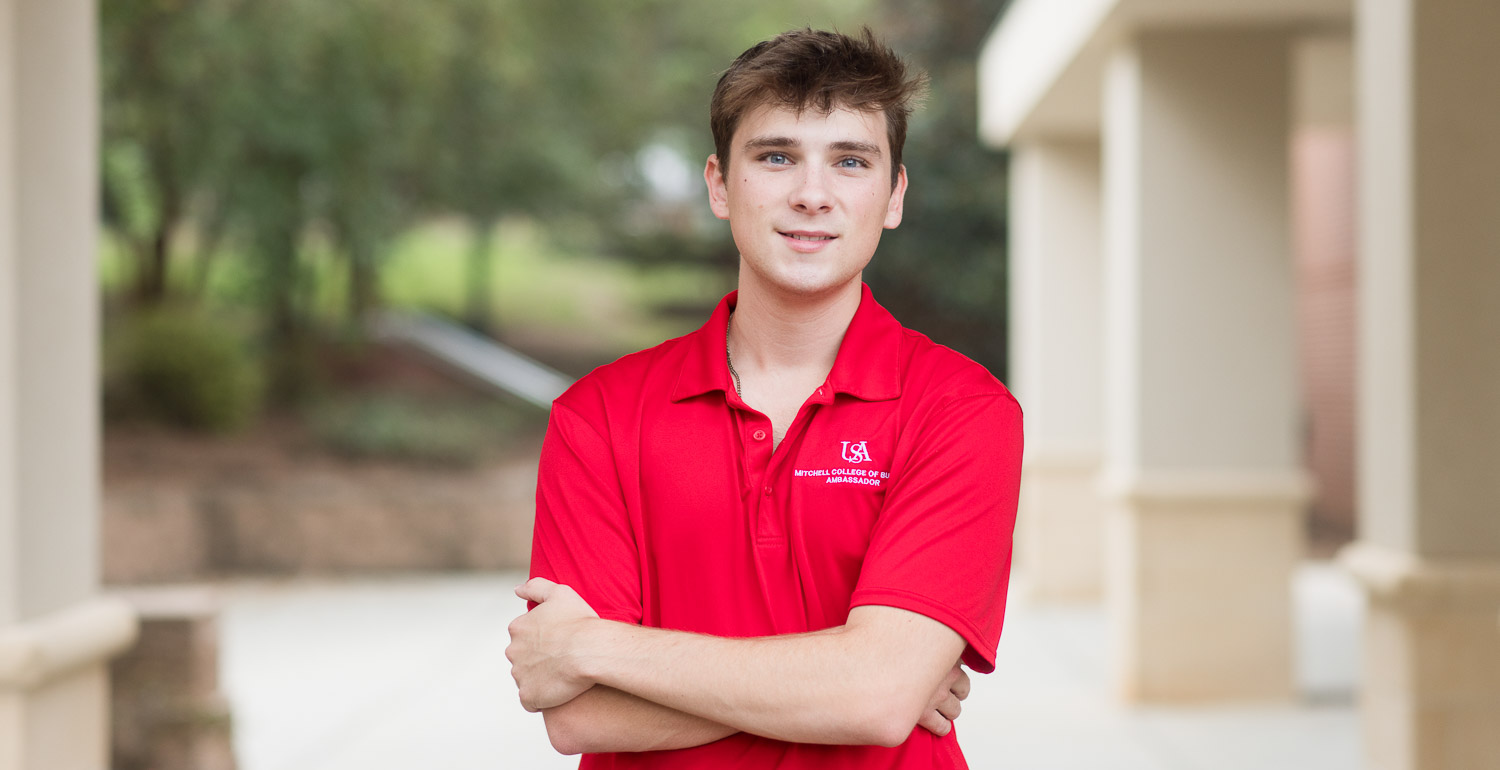Gaining Knowledge on Losing Weight
Posted on October 3, 2018

Losing weight is complicated. So is helping people live healthier lifestyles. Even a seemingly basic step, such as measuring a person’s muscle mass and body fat, can be surprisingly tricky.
So the University of South Alabama has created an Obesity Research Network involving 13 faculty members from five University colleges and schools. Collectively, their research looks at obesity from different angles. “We’re new, but so far it’s been a lot of synergy,” said Dr. Sharon Fruh, a professor and associate dean at the College of Nursing. “We’re all looking at how we can partner together for the benefit of society.”
The network formed almost by accident. Early in 2018, Dr. Geoffrey Hudson visited Dr. Kimberly Littlefield, then assistant vice president for research communication, development and learning. Hudson, an assistant professor of exercise science, was in the middle of his first year at South. He wanted to talk about grant opportunities. His research interests include metabolism and weight management, and he has worked on using 3D cameras to measure body muscle and fat.
“She mentioned that she had talked with a number of other people that year who were interested in obesity research,” Hudson said. “So she put together the cohort of people from all across the University who were doing obesity-related research.”
The network started in March. “It’s been incredibly helpful,” he said. “This is the third university that I’ve worked at. Thanks to this network, it’s been the easiest place to build interdisciplinary collaborations. There are people in this network that would have taken me years to get to know if we hadn’t already had these meetings together.”
"This is the third university that I’ve worked at. Thanks to this network, it’s been the easiest place to build interdisciplinary collaborations."
The colleges and faculty involved in the network include:
- College of Medicine: Dr. Diego Alvarez, associate professor of physiology and cell biology
- College of Nursing: Fruh; Dr. Heather Hall, dean; Dr. Rebecca Graves, director of special projects and evaluation; Dr. Susan Williams, assistant professor of community and mental health
- College of Education and Professional Studies: Hudson; Dr. Caitlyn Hauff, assistant professor of kinesiology and health promotion; Dr. Ryon McDermott, assistant professor of counseling
- College of Arts and Sciences: Dr. Benjamin Hill, associate professor of clinical neuropsychology; Dr. Hosik Min, assistant professor of sociology; Dr. Kimberly Zlomke, associate professor of clinical psychology
- School of Computing: Dr. Scott Sittig, assistant professor of health informatics; Dr. Matt Campbell, assistant professor of information systems and technology
Each brings specialized interests, skills and knowledge that others in the network can draw on. For example, Hudson has been involved in developing and testing 3D camera scanning for measuring body fat and muscle mass.
Other ways of measuring all have drawbacks. Body mass index calculations (which use height and weight) and the bioelectrical impedance analysis machines often found in fitness centers can vary widely in accuracy. Calipers that measure skin folds are better but require precise measurements by trained experts. Dual-energy X-ray absorptiometry is an industry standard, Hudson said, but a 3D camera system is more portable and cheaper, and doesn’t expose the patient to radiation.
Is 3D camera scanning accurate? “In theory it is,” Hudson said, “but it hasn’t been thoroughly tested yet.” Testing is especially needed on clinical populations — cancer survivors, for example, or people who have had bariatric surgery for weight loss. “So through this network I will be able to work with some of the faculty to do body fat testing on clinical populations and look at changes in body fat using this 3D imager,” Hudson said.
But giving data to human beings isn’t like feeding data into a computer. “After telling people their body fat for years, I’ve learned it can make them angry at times and be depressing,” Hudson said. “Also, seeing your 3D image of you in your bathing suit or in your underwear, how does that impact a person’s body image and body esteem? I am not an expert in psychology or in administration of psychology questionnaires and surveys.”
Hauff, who specializes in body image and weight stigma research, is. So she can help. “Without having to develop a whole new expertise,” Hudson said, “I can easily partner with other people in the network who have the expertise to answer some of these research questions.”
Accurately measuring muscle and fat can be crucial for a weight-loss program, Hudson said. Some overweight people who start exercising don’t lose weight, even though they’re becoming healthier overall. So they get discouraged and give up.
Muscle is denser than fat and can weigh more. “If you take two people who are in the same weight-loss program, and one is exercising and one isn’t, the one who isn’t exercising might actually lose weight faster just because they’re losing muscle mass,” Hudson said. “The person who’s exercising is maintaining their muscle mass and losing fat, but they’re not losing as much overall body weight.”
In the long term, you want the muscle mass. Without it, “your mortality risk goes up,” Hudson said. “Your risk for chronic diseases, especially diabetes, is going to increase as you lose muscle mass.”
Obviously, obesity research has tremendous practical applications. “Alabama is ranked third-highest in the nation for obesity,” Fruh said. “And the city of Mobile recently was reported as having the highest rates of diabetes in the nation. So we definitely are in a real high-risk area. It’s a serious problem, and being in partnership with other disciplines we can really work together to ultimately benefit the community.”



